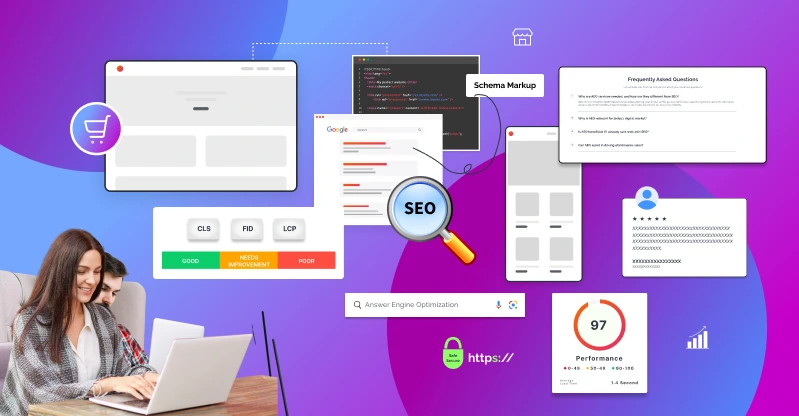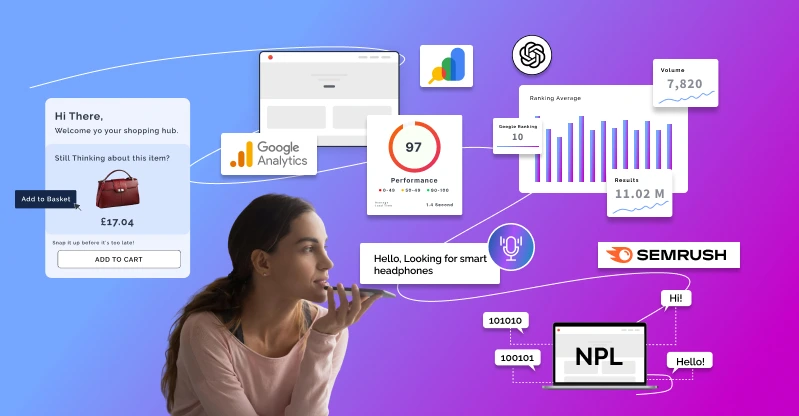How to Create a Strong SEO Strategy for the UK eCommerce Companies in 2026

Table of Contents
The UK online shopping arena has never been more competitive than in 2026. Consumers are looking for fast, quick, and personalised online purchasing.
In this scenario, having a website is not enough; firms require a good SEO plan to dominate, acquire quality traffic, and turn visitors into leads.
From product page optimisation to AI trend tapping, voice search or local SEO, a comprehensive strategy makes your eCommerce store get the maximum exposure, conversion, and stay ahead in the ever-changing digital game.
Get Acquainted with the UK eCommerce Market
The UK eCommerce market is at the height of successful SEO. Voice search, mobile, and AI suggestions are getting more and more preferred by customers as a part of the buying decision.
Ethical sourcing and green products become increasingly popular day by day, and therefore, search behaviour. Competitor SEO strategy, content, and backlink data enable you to see gaps and opportunities.
Demographic intelligence, surfing behaviour, and interests of your audience enable you to segment by campaign, content, and keywords. Analytics and marketplace data used for ROI-based and fact-based decisions.
Make a Strategic SEO Plan for Growing an eCommerce Business
Carry Out In-Depth Keyword Research
Keyword research is the basis of any SEO plan. Start with generic high-intent keywords that best represent your products. Use long-tail keywords to discover the search intent your target audience is searching for, which is closer to conversion.
Target UK cities and regions with keyword targets to welcome desired traffic. SEMRush, Ahrefs, Google Keyword Planner, and Ubersuggest are used to search for search volume, competition, and trend information.
Placing commercial intent keywords at the start allows your SEO campaign to target keywords that make the customers ready to buy.
Optimise On-Page SEO
On-page SEO practice is a commonly used feature that helps brand to grow their visibility. It helps to deliver better search engine understanding for ensuring a better user experience.
With a simple title and a keyword, users can get an engaging meta description, and quality images with ALT text describing the images should be included on each product page. Internal linking between a similar page and another shares SEO power and provides site navigation.
URLs should be brief, keyword-based, and legible. Mobile responsiveness with responsive design and quick loading is the bare minimum.
Organised test and headings can also be helpful for SEO as customers will be easily able to find the product and page, which will help them to engage effectively and rank in a better manner.
Technical SEO Best Practices
Technical SEO is a very effective practice for boosting your site’s visibility. It allows search engines to crawl, index, and rank effectively, which will eventually help to optimise their performance by compressing pictures, minimising code, and caching. It will be helpful for securing their site with HTTPS to enable users to trust and rank your site.
Use XML sitemaps and a validly formed robots.txt to guide search engine spiders. Avoid duplicate pages using canonical tags. Use product, price, and review structured data to improve rich snippets.
A technically solid site improves user experience and improves long-term SEO performance directly.
eCommerce SEO Content Strategy
Strategic content drives organic traffic, informs the user, and leads to conversions. Long-tail keyword-based blog content is rich and drives SEO. Guide and how-to content informs the customers, and trust leads to interaction.
Video content like product tutorials and unboxing guides drives dwell time and shares. Frequently asked questions pages address frequently asked questions and can be featured as Google snippets.
Regular publishing of useful content places your brand on the authority level, raises visibility, and facilitates in-house linking, social shares, and general SEO development.
Local SEO Strategies
Local SEO is critical for UK eCommerce companies to connect with local consumers and dominate locally. Complete and refresh your Google Business Profile with fresh images, posts, and information.
Use city-level keywords as titles, headings, and meta tags to get listed for local search intent. Invite high-quality customer reviews on Google and specialist websites to create trust. Invite backlinks from local news websites, blogs, and directories to create regional trust.
Local SEO puts your store right at the top of the list when people are looking for goods in London, Manchester, Birmingham, or other big UK cities.
Off-Page SEO & Link Building
Off-page SEO points your site as authoritative and powerful with signals from other places. An excellent backlink on high-visibility UK blogs, news outlets, and niche sites builds domain authority.
Brand mentions and product reviews through influencer outreach create visibility. Guest blogging on the leading sites generates backlinks and brand exposure.
Social sharing generates traffic as well as link equity opportunity potential. Regular disavowal and spam/poisonous link monitoring keeps your website spick and span. Friendly link building sets search position, conveys trust signals to the search engines, and sets brand reputation.
Voice Search and AI Optimisation
Voice search is growing at an exponential rate, and smart assistants such as Alexa, Google Assistant, and Siri are installed in almost every UK household. Voice search optimisation is done in long-tail and natural spoken conversational keywords.
FAQ pages are targeted by voice searches in the most efficient manner. Page speed and mobile optimisation are crucial, as most of the voice searching happens on a mobile. Structured data includes correct results in voice search answers.
In reference to the way UK users phrase searches, such as “Where are sustainable shoes available to purchase in London? “, it is drawn out into sight and attractiveness.
Conversion Rate Optimisation (CRO)
CRO ensures that the maximum traffic generated by SEO is converted into sales. Put bold, high-visibility calls-to-action such as “Buy Now” or “Add to Basket” on all product pages. Streamline checkout with fewer unnecessary steps and add guest checkout functionality.
Show trust factors such as secure payment logos, UK delivery information, and simple returns. A/B test page layout, headings, product information, and images to determine most-converting configurations.
Combining SEO and conversion rate optimization services allows businesses to optimise revenue potential in parallel with maximising ROI for each campaign geared towards driving traffic.

Performance Monitoring
Having performance tracked at all times is crucial in an attempt to maximise your SEO strategy and monitor ROI. Google Analytics provides information regarding user behaviour, traffic source, and conversion.
Google Search Console keeps track of indexing issues, search queries, and technical issues. SEMRush and Ahrefs are used for tracking keyword rank, competitors, and backlink quality.
Heat maps and session recordings with Hotjar or Crazy Egg detect UX issues. Conversion rate, increase in organic traffic, bounce rate, dwell time, and backlink quality are the most vital metrics.
Real-time tracking enables issues to be detected at a single point in time, so continuous optimisation and continuous SEO growth.
The Combination of User Experience (UX) and SEO
UX and SEO will never be divorced. Search engines, and Google especially, adore sites which are easy to navigate, fast loading, and accessible on the move. Proper site structure on UK online shops is all about making it easy for the customer to find what they order, look at products, sort by product, and buy without being frustrated.
Plain calls to action, large text, branding in line, and fantastic images maximise use and minimise bounce rates. It also maximises time spent on the page, and that is how it makes search engines understand that your site has incredible content.
Discoverability elements such as predictive search, open breadcrumb flows, and checkout optimised ones maximise usability to its optimal level, aside from maximising SEO performance benefit.
Accessibility elements such as proper ALT tags, keyboard navigation, and screen reader readability make your site accessible while simultaneously providing ranking power.
Prioritising UX isn’t an extra task to SEO, but also leaves customers satisfied who adore frictionless buying experiences, with the following direct impact on conversion rates alongside consistent long-term revenue boost.
SEO Friendly Product Page Optimisation
Product pages form the basis for all eCommerce SEO efforts. Full details like individual description, fine pictures, price, and shipping information have to be present on all pages.
Primary keywords can easily be accommodated in meta titles, headings, and meta descriptions for better visibility. Reviews, FAQs, and ratings give birth to social proof and rich snippet potential. Image optimisation using ALT tags describing images and quick-loading styles enhances SEO and search usability.
Duplication marking of information, such as product information, availability, and price, enables offering rich results in SERPs by search engines. Comparison product internal linking reduces navigation time and passes SEO equity from page to page.
UK optimisation involves adding localised copy, currency exchange rates, and shipping information. Use of easy-to-find images, content-driven data, and SEO suggestions results in highly ranked product pages, traffic targeted at it, and effective conversion of customers.
Mobile-First Optimisation for Online Shopping
Mobile-first optimisation is the future with UK online shopping SEO in 2026. Nearly everyone browses and shops on mobiles and tablets, and responsive design is obligatory.
Sites that are mobile-optimised experience fast page loading, fewer bounces, and improved search engine rankings. The pages must load instantly, images must be compressed, fewer codes must be employed, and correct caching must be employed so that infuriating slowdowns are prevented.
Navigation must be glitch-free with reduced menus, touch navigation, and minimal product filtering. Mobile checkout must be simple, with mobile checkout functionality being made available in the form of one-click pay, digital payments, and guest checkout to prevent cart abandonment.
AMP and mobile SEO strategies with structured data on the website provide maximum indexing and quick search results.
Mobile-first optimisation also monitors voice search behaviour since most of the voice searches occur on mobile. Mobile content optimisation ensures voice and text search optimisation for UK user intent.
Apart from rank lift, mobile-driven strategy also boosts engagement, conversion and customer satisfaction and hence becomes the centre of sustainable eCommerce success.
Key 2026 SEO Trends
a) AI-Driven Content Generation
AI writing tools like ChatGPT and Jasper write automatically on product descriptions, blog posts, and meta descriptions.
Trends are assimilated, keyword recommendations offered, and content generated at rapid rates. Quality, accuracy, and consistency are maintained through human systems.
Scalability of AI, coupled with human imagination, facilitates eCommerce sites to scale content generation without compromising high SEO performance and quality experiences.
b) Visual Search Optimisation
Visual search allows the shopper to search by image rather than text. Optimise product images with long ALT tags, packed data, and high-res images.
Simple and generic imagery places products in visual search. UK customers make greater use of visual search for comparing and searching for inspiration, so optimising it drives discoverability, engagement, and conversion.
c) Hyper-Personalisation
AI-driven hyper-personalisation and search history deliver a curated experience. Curate products, search, and promotional recommendations according to individual user interest.
Curated experiences receive the highest attention, create more conversions, and induce repeat purchases. Dynamic balance of tailored SEO content receives the highest UK consumers’ attention with optimum visibility, credibility, and loyalty.

d) Sustainability-Dominated Searches
UK consumers increasingly seek out environmentally sustainable, sustainably sourced, and ethically produced products. Showcase your sustainability efforts on meta tags, blog posts, and product labels.
Phrases like “eco-friendly skincare UK” or “sustainable fashion online” appeal to the conscious consumer. Sustainability SEO enhances trust, stands out for your brand, and enhances the chance to rank for green-aware search terms.
e) Better E-A-T Signals (Expertise, Authority, Trustworthiness)
E-A-T is also Google’s choice in competitive niches like finance, health, and beauty. Establish expertise using the right content, verification of sources, and actual references. Employ author descriptions, certification, reviews, and backlinks from real sites.
Reviews by customers generate trust. Effective E-A-T improves rankings, visibility, and conversions and transforms your store into a trusted and authentic brand.
Common Mistakes to Avoid
Mobile-First Optimisation neglects
Many UK sites are neglecting mobile optimisation, even though many consumers shop on mobiles. A slow mobile site or a non-responsive site results in poor user experience, higher bounce rates, and lower rankings. Responsive, fast mobile design is the way to search engine success and conversion.
Local SEO ignorance
Isn’t local search optimised to lose visibility in city searches? Without local backlinks, local keywords, or Google Business Profile optimisation, UK business owners miss out in top locations like Birmingham, Manchester, and London. Local SEO drives local consumers and becomes more important in geographic searches.
Duplicate Content
Repeating product descriptions or copying manufacturer text damages SEO rankings. Duplicate content is spidered by search engines and lowers visibility. Creating original, fresh product descriptions and blog posts increases user engagement and rankings and keeps your site a new, authoritative source.
Not Monitoring Analytics
No tracking hinders businesses from knowing the behind-the-scenes pages or lost visitors. Analytics offer user activity, best-selling products, and conversion issues. It is not possible to track for improvements of content, the correction of technical issues, or readjusting strategies on what is actually occurring, and this may hinder growth and ROI.
Put Traffic above Conversions
Traffic generation is not a product of selling. Not using CRO will have the visitors come and go without purchasing. Simply incorporating readily available CTAs, trust marks, evident navigation, and A/B testing will optimise conversion.
Combining SEO with CRO gets website traffic, walk-through sales, and generates high revenues and ROI.
Conclusion
To win a UK eCommerce SEO campaign in 2026 is to integrate keyword research, technical and on-page SEO, content marketing, local SEO, link building, and CRO. Constant checking, adherence to new trends surfacing, and analytics-based optimisation for growth over the long term.
UK consumer habits, usage of AI and voice search, and focus on sustainability and trust propel high-quality traffic and turn visitors into customers.
A strategic, reactive strategy makes a business competitive, keeps in touch, and draws normal sales in the constantly changing arena of eCommerce. Connect with a SEO expert to implement the right strategy for your UK business with ease.
FAQs
 How long to get results for UK eCommerce SEO?
How long to get results for UK eCommerce SEO?
SEO rankings would typically take 3–6 months, with scope for competition, site authority, and optimisation frequency.
 Would UK eCommerce sites make local SEO even more widespread regardless of national sales?
Would UK eCommerce sites make local SEO even more widespread regardless of national sales?
Yes. Local SEO gains trust, local business, and conversions in Manchester and London.
 Will human SEO work be substituted by AI?
Will human SEO work be substituted by AI?
AI aids analytics, idea generation, and keyword research, but human agency retains creativity, quality, and brand voice.
 Do product reviews aid SEO?
Do product reviews aid SEO?
Product reviews drive trust, user-generated content, and rankings in speciality categories, so by doing this, it’s boosting SEO visibility.
 Can UK eCommerce websites be vulnerable to mobile optimisation for search engine optimisation?
Can UK eCommerce websites be vulnerable to mobile optimisation for search engine optimisation?
Yes. Mobile-first indexing and increasing smartphone shopping behaviour make responsive, fast sites a requirement.



